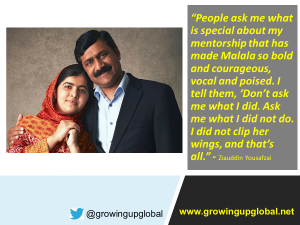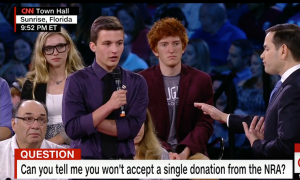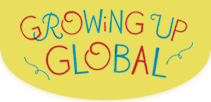A few weeks ago I had the honor of keynoting at the United Nations General Assembly to international educators about global citizen leaders. In that talk I shared Nick Kristof’s recent observation: “The person in Davos who I thought exhibited the most leadership was Malala Yousefzai …When the most mature leader around may be a 20 year-old university student, the world is in trouble” (NYTimes, Jan 26, 2018).

As I told the audience, I took optimism, not doom, from that comment. I thought this boded well for our collective future. The lessons from her mentor-father also can teach us: rather than try to direct her thoughts and actions, he insists: “Don’t ask me what I did. Ask me what I did not do. I did not clip her wings, and that’s all.”
I couldn’t have conceived that the vague future I imagined would be realized just days later. In the wake of the horrific murder of 17 people in a high school in Parkland, Florida, the surviving peers are dramatically showing the world that Malala may not be alone among her generation. These teens share Malala’s courage, eloquence, and commitment to justice. They are sparking a movement, whose force is mightier than any weapon, and I stand in awe of their determination, clarity of thought, and example of leadership during an unimaginably painful experience.

While out of school the students have been forced to learn perhaps more than they have ever needed in their lives, there’s also a quieter story on display: Educators have been preparing for this day. Not simply by participating in active shooter drills. But by arming students with powerful tools that don’t clip their wings. Some call these “21st-Century Skills” or “Modern Learners” or “World-Class Learners” or “global competence.” These are difficult to assess on a single exam, and have often seemed vague or far-away, not urgent enough for the front-burner during a short class period. Certainly, the kids speaking out from Marjory Stoneman Douglas High School in Parkland generally come from privilege. They seem to realize this and are using their privilege for a greater good. We are witnessing the culmination of their learning as students speak out for legislative change and demonstrate political courage; some of the ways in which this is manifest include:
- Knowledge is not applied one subject-area at a time: Arguments are made with a knowledge of history, civics, statistics, and neuroscience – often in the same sentence.
- When learning has purpose, it spurs passion.
- Social media can be used for social good. This also comes when it is coupled with purpose and passion.
- Rigor is almost boundless when it is around a subject students care about. Student speeches at the Florida capitol cited knowledge gained in Advanced Placement (AP) classes. Clearly this didn’t start and end with an exam, but gained life in its application, and students have taken it to a level that would make graduate students proud.
- The quality of student work rises when it is intended for an authentic audience. If the world – even if that’s a couple people – is watching you (e.g., you post a video, blog, podcast, artistic creation on view beyond your teacher), you naturally push yourself to a higher standard.
- Learning divorced from emotion and empathy doesn’t stick. When it is backed by something you really care about, you not only remember it, it can empower you, and you can’t help but get emotional about it. Yes, this is a cycle.
- Coming together as a united community creates strength to push through the most difficult challenges. When someone has your back, you can stand up, even when you just want to fall.
- Diversity is a source of strength, knowledge, and pride. As diverse students and families have spoken up, each voice gains power and contributes to the greater good, knowing their community stands with them. Brilliance is released, and the community is stronger as a result.
- The challenges of our times call for learning coupled with action. Knowledge devoid of action dies, at best. When taking action becomes a natural part of the learning process, this creates “global competence” and a natural motivation to iterate and experience deeper learning.
- With very little recognition, teachers throughout this country are doing heavy lifting, spurring critical skills that are arming youth to inspiring heights of leadership.
There is so much to consider amidst great crisis and uncertainly encircling us. I aim to be mindful of the bright lights that emerge amidst the shock and sadness.

